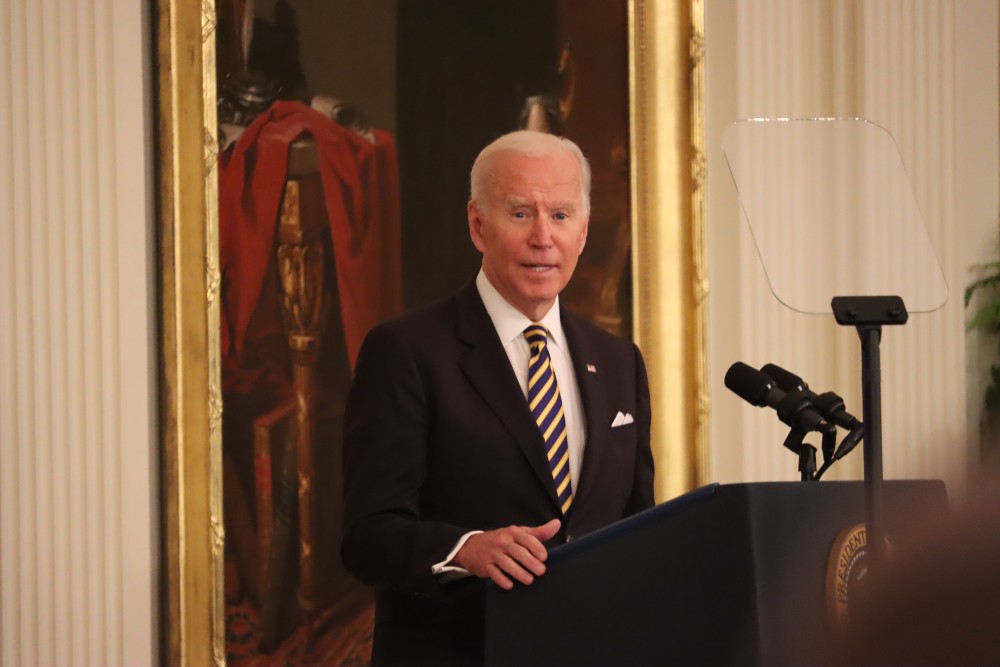
- Details
- By Darren Thompson
Washington, D.C.—On Wednesday, President Joe Biden, First Lady Dr. Jill Biden, and Education Secretary Miguel Cardona hosted the Council of Chief State School Officers’ 2022 National and State Teachers of the Year ceremony to honor some of the country’s top educators at the White House.
A winner from each of the 50 states, as well as the Department of Defense’s education program were included in the ceremony.
Three of those recognized either teach on Indian reservations or are American Indian.
Bill Stockton teaches on the Flathead Indian Reservation and works to incorporate Tribal culture in high school science. Deanne Moyle-Hick is an elementary teacher on the Pyramid Lake Paiute Indian Reservation; and Jerad Koepp is a member of the Wukchumni and currently serves as the Native student program specialist for North Thurston Public Schools in Olympia, Washington.
“It’s a really exciting time for Native education,” said Koepp told Native News Online at the White House. “The work that’s being done speaks to the needs of our people.”
According to Koepp, just 0.7 percent of teachers in the state of Washington are Native American. “We need representation in the classroom,” he added. His school district requires Native civics and history courses that also provide college credit to students. “We want our students to see our knowledge and what they are learning in the classroom as an asset,” he said.
He also helped co-write legislation that requires all administrators and teachers in Washington to understand government-to-government relationships with Tribes.
Dr. Biden, who also teaches English at Northern Virginia Community College while serving as First Lady, applauded the work of teachers, saying, “right now, someone out there is a better thinker because of you. Someone is standing a little taller because you helped her find the confidence that she needed. Someone is working a little harder because you pushed him to try. Someone is a little kinder because you showed her what that meant. And someone is braver because you helped him find his courage.”
This year’s National Teacher of the Year is Kurt Russell, from Ohio, spoke briefly after the First Lady. Russell teaches history and developed a course on race, gender, and oppression. “It's important that my students see themselves as I see them: With unlimited potential and full of gifts,” said Russell. “School is where dreams come alive.”
The ceremony was hosted amid a Republican-led effort nationwide to restrict lessons related to sexual identity, gender and race nationwide.
“I’m here today, because someone taught me,” Presiden Biden said. “American teachers have dedicated their lives to teaching our children and lifting them up. We ought to stop making them a target of the culture wars. That's where this is going.”
Biden closed by pledging support for education and stating that First Lady Dr. Jill Biden fully supports teachers and education in America.
More Stories Like This
10 Years of Building Business Dreams for Indigenous WomenIchigo Foundation Awards American Indian College Fund Adult Education Program
Bard College Center for Indigenous Studies (CfIS) Hosts Annual Symposium With Keynote Speaker Miranda Belarde-Lewis on March 9–10
American Indian College Fund Announces Spring 2026 Faculty Fellow Cohort
Navajo Nation Signs $19 Million Diné Higher Education Grant Fund Act into Law
Help us defend tribal sovereignty.
At Native News Online, our mission is rooted in telling the stories that strengthen sovereignty and uplift Indigenous voices — not just at year’s end, but every single day.
Because of your generosity last year, we were able to keep our reporters on the ground in tribal communities, at national gatherings and in the halls of Congress — covering the issues that matter most to Indian Country: sovereignty, culture, education, health and economic opportunity.
That support sustained us through a tough year in 2025. Now, as we look to the year ahead, we need your help right now to ensure warrior journalism remains strong — reporting that defends tribal sovereignty, amplifies Native truth, and holds power accountable.
 The stakes couldn't be higher. Your support keeps Native voices heard, Native stories told and Native sovereignty defended.
The stakes couldn't be higher. Your support keeps Native voices heard, Native stories told and Native sovereignty defended.
Stand with Warrior Journalism today.
Levi Rickert (Potawatomi), Editor & Publisher
